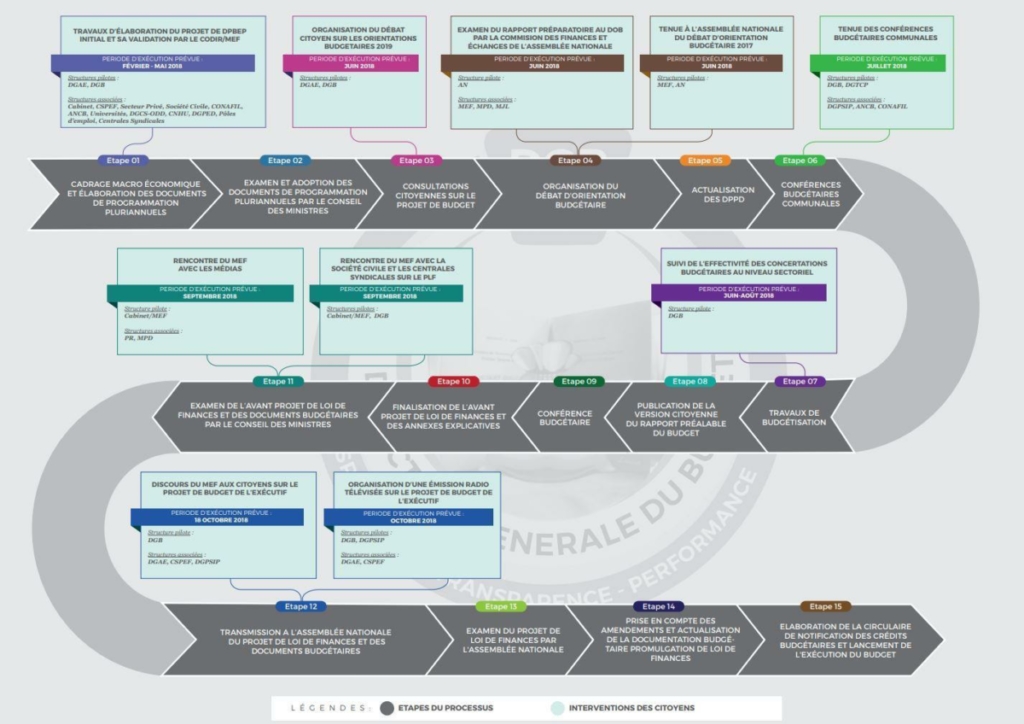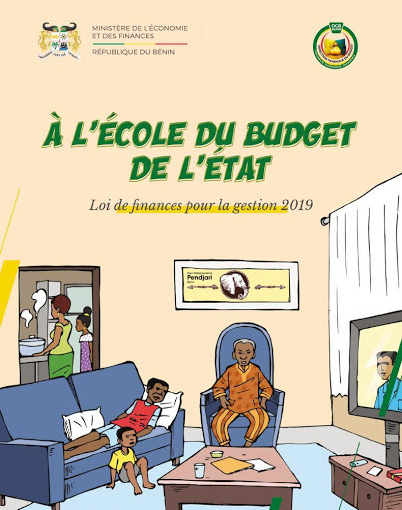Rodrigue Chaou is Director General, Pierrot Sego is Director of the Budget Formulation and Evaluation Unit, and Mirielle Codjovi is Head of the Budget Transparency and Communication Pilot Unit of the Budget Directorate in the Ministry of Economy and Finance in Benin. They were part of CABRI’s Country Partnership for Greater Accountability Twinning programme between the Ministry of Economy and Finance of Benin and the Ministry of Budget of Guinea-Conakry in 2018 and 2019. This blog describes Benin’s experience in improving budget transparency, accountability, and participation from the perspective of practitioners who continue to implement such reforms.
Participants to CABRI’s Country Partnership for Greater Accountability programme between the Ministry of Economy and Finance of Benin and the Ministry of Budget of Guinea-Conakry.
Since 2013, following the publication of the Open Budget Survey 2012 carried out by the International Budget Partnership (IBP), Benin has committed itself to enhancing public accessibility to budget and financial information, to promoting public participation in the process of financial decision-making and to improving the contribution of Parliament to public finance management in general.
Until 2012, the drafting, adoption, implementation and audit of the execution of the Finance Act were not accompanied by any activity aimed at ensuring the transparency of the budget process. The stakeholders involved came mainly from the public sector and budget documents were produced for the government for internal use only. The following was therefore evident:
- a lack of dialogue with the public on defining economic and budgeting goals;
- unclear goals of government policies;
- poor compliance by citizens with implementing essential reforms;
- a complete absence of any mechanisms to access information on public financial management (no culture of accountability); etc.
The main issue in Benin at the time was the dual questions of how the budget process should be included in an initiative aimed at regular and continuous communication with citizens and the nature of the supporting documents to serve as a basis for constant interaction between the public financial administration and citizens on the budget process.
A review done in 2013 on the practice of transparency and openness in terms of the budget in Benin revealed the following:
- matters relating to questions of public access to budget data were not adequately dealt with;
- there were no mechanisms to involve the public in the budget process;
- documentation on the Finance Bill was inadequate;
- there was a significant divergence between the contents of budget documents and the information required, taking into account each stage of the budget process according to international standards; and
- there was a communication gap on the results from the execution of the national budget.
This picture reveals a multiplicity of challenges: the identification of the appropriate channels for the dissemination of budget information, the establishment of strategies for consulting citizens on budget guidelines, discussions with the various layers of society on government policy choices, the provision of more information to members of parliament by increasing the amount of information given in the annexes to the Finance Bill, making the content of budget documents more comprehensive and promoting public administration as well as a sense of accountability.
An analysis of the scope of activities covered by the various aspects of budget transparency has shown that the practice of budget transparency, public participation in the budget decision-making process and accountability is not limited to the sphere of competence of the Executive. It extends to the legislative authority and also takes the jurisdictional authority into account in order to be comprehensive. Therefore Benin, on the basis of the multidisciplinary and cross-cutting nature of budget transparency, opted for an integrated approach regarding the definition and implementation of actions aimed at improving citizen participation in the public financial decision-making process, accountability and transparency of budget processes. On 31 May 2013 this approach became official with the organisation of a national workshop to disseminate the results of the 2012 IBP results. As a prelude to the workshop, an analytical report of the results and the completion of the review on budget transparency were produced. This report was used as a supporting document for discussions. Senior officials from central structures of the Ministry of Finance, delegates from civil society organisations, members of parliament as well as development partners all participated. This was an opportunity for stakeholders in public financial management to find out about the cornerstones of budget transparency, to familiarise themselves with the IBP open budget evaluation methodology, the timely publication of budget documents, and to discuss the observations and recommendations made by the evaluators with regard to Benin. The workshop also made it possible to share good practices and standards defined internationally with regard to transparency (such as OECD and IMF standards).
The proceedings of the workshop held on 31 May 2013 led to the adoption of a resolution which has since been the main theme of activities promoting transparency and public participation in the budget process. This relates to the decision, each year, to establish an annual plan of action to improve budget transparency, public participation and to give impetus to the accountability ecosystem. The action plan to improve budget transparency and public participation in the budget process in Benin is a matrix of actions to be carried out alongside government and parliamentary activities, together with those of the Supreme Audit Institution, to promote budget transparency.
During 2018 the practice in Benin of developing and implementing action plans to promote budget transparency was supplemented by a novel experiment: that of instituting an action plan based on challenges identified by Benin and Guinea-Conakry, within the framework of the twinning programme initiated for their benefit by CABRI.
It should not be forgotten that, in March 2018, the Cabinet meeting approved Benin’s accession to the Collaborative Africa Budget Reform Initiative (CABRI).


Significant innovating activities have resulted from the effective implementation of the plan. Amongst other things, these are the:
- drafting, publication and distribution to civil society organisations of pamphlets on the chain of actions involved in preparing the national budget (emphasising the ten main stages out of the 15 that deal with public participation);
- organisation of a capacity-building workshop for the members of more than 20 civil society organisations;
- drafting, translation and publication in several official languages of videos on the executive’s budget proposal and the enacted budget;
- strengthening access to information on the execution of the Finance Act (the regular production and distribution of citizen versions of the various reports: in-year reports, mid-year reports and end-of-year reports) ;
- institution of a collaborative platform with the role-players of ministries responsible for executing priority social expenditure, combined with sectoral action plans for citizen participation; and
- drafting and publication of a comic strip on the state budget, management 2019.
In addition, the activities included in the twinning plan, several other reforms were instituted such as:
- the organisation prior to each budget process of a budget calendar distribution workshop for all the social partners, civil society stakeholders and media organisations;
- the organisation of a discussion morning with CSOs ;
- the participation of civil society in periodic sectoral reviews ;
- inviting civil society to budget orientation debates in the National Assembly ;
- each year organising budget conferences at local level to gain an understanding of the real needs of grass-roots citizens in order to include them in the Finance Bill ;
- every year, introducing the Finance Bill to the private sector, union confederations and central labour bodies, technical and financial partners and the Economic and Social Council to enable them to grasp the economic and social policies before its adoption by the members of the National Assembly; and
- holding hearings on the Finance Bill for union structures, civil society, the private sector and the Benin Municipalities National Association in the National Assembly.
Thanks to the Benin-Guinea twinning (Country Partnerships for greater accountability programme), to which can be added courageous and innovative reforms, the citizens of Benin are very closely involved in decision-making and regular reporting. The facts therefore speak for themselves as to the reality of civil society engagement in the budget cycle from the planning stage through to the preparation, execution and audit of the budget.
Various other reforms aimed at improving public participation in the budget process are envisaged for the future. Among these are:
- the launch of the budget literacy initiative for primary school, high school and university learners;
- continuing efforts in raising awareness about budget information by the institution of a formal framework for discussions with citizen action groups and enhancing dialogue between the state and local authorities to promote a budget process that favours local development;
- continuing to build capacity in non-state actors and local elected officials (training of civil society organisations and local officials on the concept of the open budget;
- signing a partnership with the network of CSOs in Benin for the wide distribution of budget and financial information; and
- improving the contents of budget transparency by producing and publishing the eight key reports.